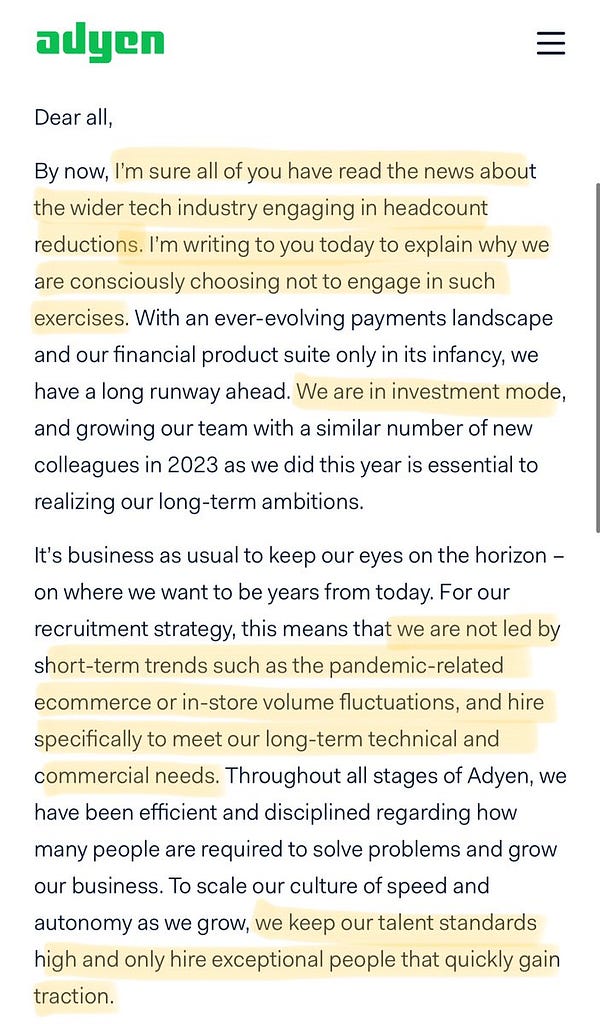Sunday Finds + 3 Thoughts From Last Week
Podcasts on Ansys and eDreams and some links to the FTX Debacle
Welcome to Chit Chat Money’s Sunday Finds + 3 Thoughts From Last Week. In this newsletter you will find three topics I thought about last week, links to shows we’ve recently released, and links to some interesting articles, podcasts, and tweets. Check out the archive here.
Podcasts From Last Week:
Why eDreams Is Winning in European Travel With Chadd Garcia (Ticker: EDR)
Investing Power Hour #32: FTX Collapse, $ADYEN CEO Letter, Graham & Dodd Annual Breakfast
Chit Chat Money is presented by:
7investing, an investing service where you get monthly stock recommendations, best buy portfolio analysis, and in-depth market research. Use our code “MONEY” at check out and get $100 off your annual subscription for life!
1. Three Lessons From Capital Returns
This week I finished Capital Returns, a book written by the renowned European hedge fund Marathon Asset Management. For this week’s thoughts, I am going to share three quotes I bookmarked from my reading.
First one:
The concept of the capital cycle provides a broader explanation as to why corporate profitability lags GDP. The primary driver of healthy corporate profitability is a favorable supply side — not high rates of demand growth. Hence, it is possible for there to be rapid growth in an industry that brings little or no benefit to investors.
This was the biggest takeaway from the book for me. Many investors (myself included) focus too much on the demand curves for various industries and not enough on supply variations. Too much supply because of a hyped-up innovation or trend can decimate returns for shareholders even if the industry becomes much larger 10 years from now.
You want to play in industries with rational suppliers and avoid ones that are irrational (unless you’re shorting, of course). Here are some industries I think generally have rational suppliers vs. what customer demand looks like:
Tobacco and nicotine
Video game developers/publishers
Dating apps (still a very young industry, so maybe TBD)
Engineering software (and other creative software providers)
Some industries I believe have irrational supply:
Electric vehicles
TV and movie content publishers
Venture capital
What are some others you can think of on either side? Let me know in the comments, or if you disagree with any of my choices.
2. It has been and always will be difficult to invest with a long time horizon
Quote number two:
Over short time periods, share prices are generally driven by other factors such as macroeconomic or stock-specific news flow. Investing in a high-quality company can seem dull and unrewarding in the near term. the lower risk which comes from investing in quality companies is only properly observed over the long term. The fact that investors are often focused more on the short-term is partly a function of psychology — the human brain is simply not attuned to multiyear planning.
Long-term in this case means 10 or more years.
If you are a fundamental investor, you’ve likely heard and read something like this dozens of times. But it is so important to focus on. Why? Because as humans we are wired to think about what is going to happen in the immediate future, so as investors we need to constantly bias ourselves and swing our personal pendulum to expand our time horizons.
This is especially true in bear markets where it seems like more and more people are worried about quarterly earnings reactions. But if you own a quality business (and paid a reasonable price for it), things will work themselves out 10 years from now.
3. Meeting management teams the right way
Quote number three:
Meeting management is not a scientific process. Rather, it involves making judgments about individuals, an activity that is prone to error (witness the rate of divorce). We go into meetings looking for answers to questions such as: does the CEO think in a long-term strategic way about the business? Understand how the capital cycle operates in their industry? Seem intelligent, energetic, and passionate about the business? And interact with colleagues and others in an encouraging way? Appear trustworthy and honest?
Most of you reading this (me included) are not at a spot where we can meet privately with management teams. Don’t be discouraged though, because Marathon says in general it is actually a harmful practice unless you come in with the right mindset (and are really skeptical).
CEOs are salespeople. The best in the world, in fact. How do you think they got those jobs in the first place? So when talking with them and hearing them speak, it is best to be skeptical and critical of what they are saying. Otherwise, you can be susceptible to falling to an overpromising team and overdue your personal projections for the business (don’t need to explain the downside of that this week!).
Marathon has a specific set of questions they like to ask management teams. These aren’t used to identify how a business works but to shed light on a CEO’s personality, ethics, and whether they truly understand how their industry works. The examples of financial CEOs in the 2000s were especially illuminating.
If you are interested in more detail on how to evaluate management teams, I’d recommend picking up a copy of the book. This blurb is just scratching the surface.
See you next week,
Brett
***Our fund, Arch Capital, may own securities discussed in this newsletter. Check our holdings page and read our full disclosure to learn more.***
***Want our FREE weekly wrap-up delivered to your inbox each week? Subscribe here***
3 Good Reads
The Latest Domino to Fall - Net Interest
The situation gets worse when we look at how Alameda funded its FTT position. Within the $8 billion of liabilities on Alameda’s balance sheet are $7.4 billion of loans. According to the WSJ, these loans come from sister company FTX. Indeed, by this week, that loan had increased to $10 billion. Reports suggest that FTX initially made the loans to bail Alameda out of losses it incurred when crypto markets went into turmoil in May. Alameda’s FTT holdings served as collateral for the loans.
"Shocking" is a word that aptly describes the rapid fall of Sam Bankman-Fried’s cryptocurrency empire. To a surprising degree, it’s a sentiment that pours out from people who worked for him, people who you’d think would’ve had a clue.
How can that be? It may have something to do with a luxury penthouse in the Bahamas. That’s where 30-year-old Bankman-Fried is roommates with the inner circle who ran his now-struggling crypto exchange FTX and trading giant Alameda Research.
FTX Held Less Than $1 billion in Assets Against $9bn in Liabilities - the Financial Times
A spreadsheet listing FTX international’s assets and liabilities, seen by the Financial Times, point at the issues that brought Bankman-Fried crashing back down to earth. It references $5bn of withdrawals last Sunday, and a negative $8bn entry described as “hidden, poorly internally labled ‘fiat@’ account”. Bankman-Fried told the Financial Times the $8bn related to funds “accidentally” extended to his trading firm, Alameda, but declined to comment further. Earlier this week, he tweeted that FTX international had $4bn in easily tradeable assets when it faced Sunday’s $5bn surge of withdrawals.
1 Good Listen
Trevor Milton sold a promise—a zero-emissions semi truck that could revolutionize the trucking industry. He also sold himself as the visionary founder capable of delivering on that promise. In this episode, we take you back to Trevor’s early years as an entrepreneur, and you’ll hear from some of the people who helped him build the businesses that came before Nikola.
Smart and Funny Tweets:















Couldn’t agree more with quote #2. It is very hard for people to keep the long term perspective in focus.